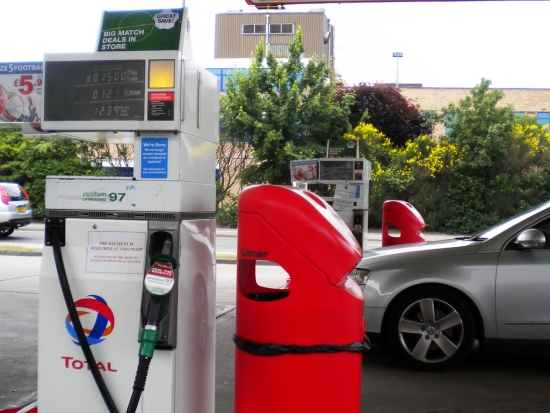One of the biggest issues facing the country at the moment is the rising cost of fuel. As petrol and diesel prices continue to increase, so too does the price of every day necessities such as food, clothing and, of course, travelling. This is because delivery companies forced to pay more to fill up their lorries pass on the increased cost to retailers, who then pass it on to us, the consumers.

What we find ourselves in, then, is a vicious circle. Consumers having to pay more to feed and clothe their families have less cash to spend on other things, such as filling up the family car.
This goes a long way in explaining why the volume of fuel sold in UK forecourts in the past year has dropped dramatically, with 12 per cent less sales when compared to 2011. According to the Department of Energy and Climate Change, around 500 million litres of petrol and diesel were sold between April and June of 2012 compared to the same period only a year earlier.
Furthermore, when compared to pre-recession sales, the difference is even more startling. The DECC says that the difference between the volume of fuel sold in the first half of 2008 and the first half of 2012 amounts to almost 2 billion litres – conclusive proof, then, that the combination of mounting fuel prices and the recession still holding the average person’s finances in an iron grip are having a direct effect upon the UK’s motorists.
In fact, in the past quarter alone, petrol sales received a particularly hard knock, with a drop of more than 10 per cent compared to the preceding three months. Of course, this could be due to the fact that first quarter sales were heavily disrupted due to warnings of a fuel tanker drivers’ strike. This caused panic buying, thus pushing up sales in March and April.
President of motoring group the AA, Edmund King, says; “A 10.6 per cent fall in petrol sales in this past quarter is a huge drop.
“While we welcome the fact that new cars have become more fuel efficient, this goes nowhere near to accounting for the crash in demand over the past three months and the past five years.
“Ever increasing prices in recent years have sent petrol sales into steady decline and the panic buying at the end of March may have brought forward sales in early April. Wet weather may also have played a part.”
As Movehut reported last week, many British motorists have begun to forego small luxuries to keep their car on the road. A survey by Moneysupermarket.com showed that drivers now spend less on their social lives, cannot afford foreign holidays and often go without purchasing new clothes due to the high cost of filling up their car with petrol or diesel.
The mounting fuel prices in the UK have even attracted the attention of the Government and many consumer regulatory boards. Currently, the Office of Fair Trading is investigating the fuel industry and deciding whether legal intervention is required to protect consumers from profiteers, while suggestions of an independent panel being established to monitor the prices of fuel retailers is still in the pipeline.
Mr King believes that the only way fuel sales will once more become buoyant in this country is if motorists believe they are getting a good deal for their money, rather than burning through their bank accounts.
He continues; “A fall of 2.27 billion litres in UK fuel sales over the first six months of this year compared to the same period in 2008 has got to bring some sense of reality to the fuel market and the Government.
“However, we have seen the fuel industry trying to squeeze more money out of shrinking customer demand, as was the case when wholesale diesel was cheaper than petrol in early spring but drivers and businesses were forced to pay 5 pence a litre more.
“Price transparency is the way forward: to ensure and show drivers that they are getting a fair deal at the pumps.”
Yet with fuel prices beginning to reach record high levels once more this year, it seems that drivers will still be forced to watch their spending in order to fill their cars. And with Chancellor George Osborne intending to implement the delayed August 3 pence per litre fuel duty hike from January, things are only going from bad to worse for the nation’s motorists.
Do you think fuel duty costs should be frozen, given that rising prices of wholesale oil are fast making petrol and diesel unaffordable for many people? Is the idea of an independent body monitoring the prices supermarkets and other fuel retailers charge per litre a good one, in your opinion? Let us know your thoughts on Britain’s burning issue in the comments section below!